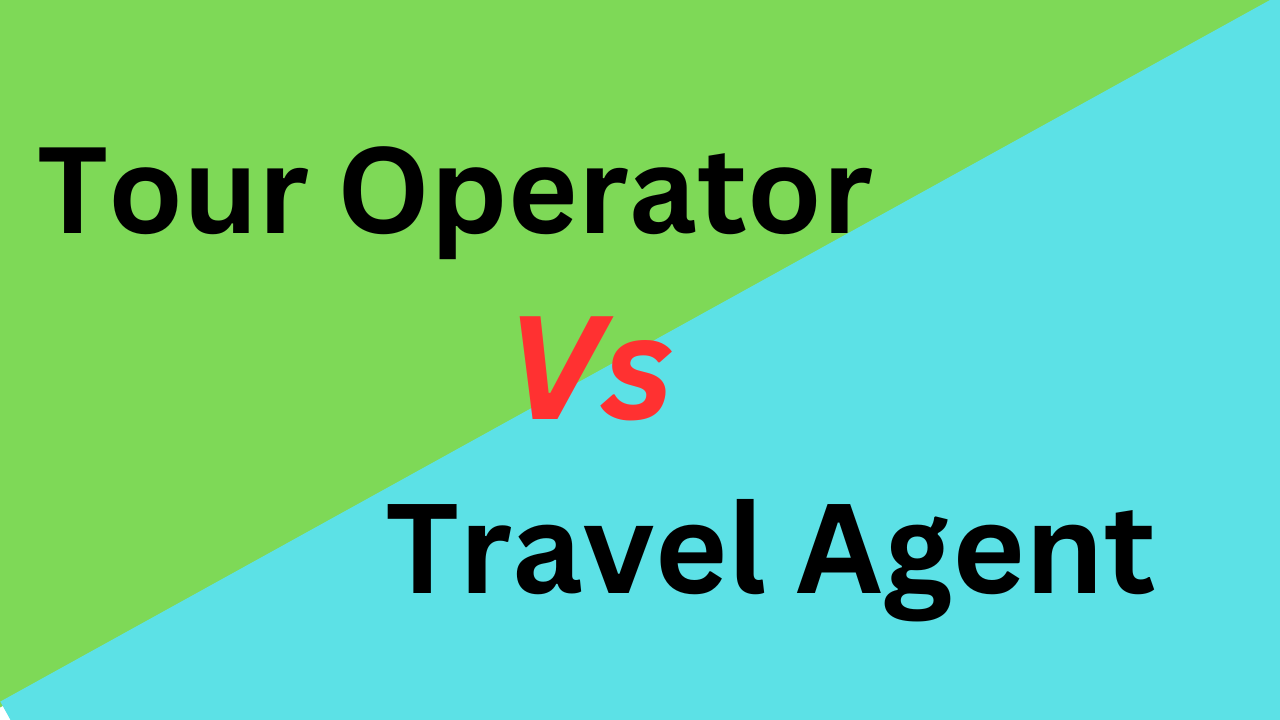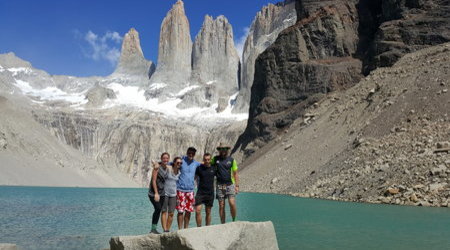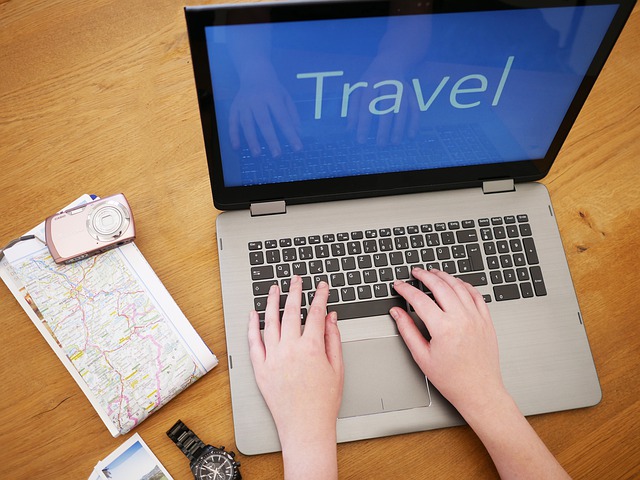
Travel agencies and tour operators both are necessary for the travel industry. But sometimes the question arises re their actual definition.
How are they different?
If you’re often confused by the difference between a travel agency and a tour operator, we’re going to discuss these two roles, and outline the significant differences between them.
They’re often connected, but are not the same.

The Difference Between a Travel Agency and a Tour Operator
Travel agency.
A travel agency is a company who plans, arranges, books, and makes the necessary arrangements for travellers. They sell flights, accommodation and tours, and package them together for travels who don’t wish to book themselves.
Worth noting that there are now many independent travel agents, who take on this role without being connected to an agency, and this can be a great travel industry job for people who want to work remotely.
There are several types of travel agents. Some put together itineraries from scratch for their clients while others work for specific travel companies, and some are mere resellers of pre-packaged tours on behalf of Host Agencies.
However most will help you plan your trip, and make suggestions based on your interests, your budget , and your travel requirements, the benefit here being that they’re experts in booking travel, and know the best tricks for planning and booking a holiday.
Pro tip: An MLM scheme can usually be identified when there is a set-up cost involved in working for the company as an agent. You shouldn’t have to pay to work for someone.
Travel agents are professionals – in many countries agencies need a travel agency license , meaning they are qualified and licensed to book trips on behalf of other people.
The way they make money is through access to industry discounts from companies they work with, which allows them to add a markup / commission to make money without charging more to the traveler.
Tour Operators
A tour operator is someone who organizes, prepares and runs a holiday tour. If you book a tour which includes accommodation, transport, breakfast, tour guides, and sightseeing etc, this is organized by the operator.
Essentially, they sell a product that they themselves create. They work with suppliers to create a packaged tour which they put their own price tag on, and can be booked by travel agents for their clients, or by the traveler directly.
They do not sell anybody else’s packages (which travel agents do), they only organize and sell their own tours.
Just as there are many different types of agents, there also are many different types of tour operators , including inbound tour operators, outbound tour operators, domestic tour operators, and ground tour operators.
Though even inbound and outbound tour operators, who bring tourists to a country and handle all the arrangements in that country, will hire local travel agents to book in things like airport transfers, and maybe even hire ground tour operators for the tour itself.
With advances in technology, many travelers now book their packages directly with the tour operators rather than going to a travel agent, where-as in the past travel agencies were often the only option for connecting with a tour.
Key Differences Between Travel Agencies and Tour Operators
➤ Travel agents sell the holiday package purchased from different tour operators. Tour operators take care of the clients according to the package description like airport pick up, meal facilities, sightseeing, offering other travel destinations, etc.
➤ Tour operators are often specialized in one, or very few countries. But travel agents can deal with most destinations.
➤ A travel agent earns less profit, usually a small mark up or commission based on the travel they’re booking. Tour operators have the potential to earn a huge profit, as they set their own price tag.
➤ Travel agents can’t work without the help of tour operators. But tour operators can work without a travel agency being that people are now more likely to contact tour operators directly for a holiday package.
➤ There are different kinds of training programs available to start a travel agency. In comparison, the tour operator requires proper business management skills.
If You Liked This Post You May Also Like:
Keep Your Passport Safe While Traveling
How to Plan a Trip to Europe – No Travel Agent Required
Things You’ll Need When Applying for a Visa

Megan is an Australian Journalist and award-winning travel writer who has been blogging since 2007. Her husband Mike is the American naturalist and wildlife photographer behind Waking Up Wild ; an online magazine dedicated to opening your eyes to the wonders of the wild & natural world.
Having visited 100+ countries across all seven continents, Megan’s travels focus on cultural immersion, authentic discovery and incredible journeys. She has a strong passion for ecotourism, and aims to promote responsible travel experiences.
Great information on Travel Agency and Tour Agent.
Glad the post was helpful for you Bella, thanks for reading :)
Thanks so much.it was helpful
You’re welcome! Thanks for reading :)
Thank you Megan,
We are a small family tour operator here in Tasmania. Specializing in small private experiences, with great guest focus, attention to interests and needs. Delivering balance of Tassie wild, depth in past and present with a side order of creative local produce.
We small and passioante operators need to support each other.
Great to connect with you Ben! Weve recently moved from Tasmania to Cairns, but Tassie will always be home :)
Post a Reply Cancel reply
Your email address will not be published. Required fields are marked *
Save my name, email, and website in this browser for the next time I comment.
Search This Site

I am Megan Jerrard, professional travel blogger/journalist with a focus on adventure, discovery, immersion and inspiring you to explore!

Recent Posts
- The Stats on How Travel Affects Your Relationship
- A Woman’s Guide to Staying Healthy on the Go
- The Ultimate Guide to Marketing Travel Portrait Photography
- An African Dream: Must-See African Destinations for 2024
- The Best Sustainable Ways to Get Around on Vacation
Popular posts
- International Love: Maintaining a Long Distance Relationship
- Illegal Ink – 11 Countries Where Showing Your Tattoos Could Get You Kicked Out!
- 7 Things To Know Before Travelling by Overnight Train in Vietnam
- A Travelers Guide to Tap Water: Countries Where The Drinking Water is Unsafe
- Countries That Don’t Celebrate Christmas
Core Differences
We Provide Comparison for All Terms
10 Difference between Tour Operator and Travel Agent (With Table)
Technological advancement has made traveling around the world easier. But a lot of people have lost thousands of dollars when trying to book holiday packages online.
Travel industries have tried to get rid of these misconceptions by introducing tour operators and travel agents. The purpose is to protect travelers from scammers in the online travel industry.
Many people usually find tour operator and travel agent terms quite confusing. This industry jargon may sound the same but that is not true in real life.
So, what is the main difference between tour operator and travel agent? The former is the company or an individual responsible for planning the trip while the latter is the broker or intermediary selling the tour package.
The relationship between the travel agent and tour operator can be confusing for first-time travelers. Understanding the definition of travel agent and tour operator is crucial in this case.
This article provides insight into the differences between tour operators and travel agencies in a tabular form. Take the time also to read the similarities between tour operators and travel agents.
You May Also Like: Difference between Washington and Washington DC

Comparison Table (Tour Operator vs Travel Agent)
Who is a tour operator.
A tour operator is a person or company responsible for planning, arranging, advertising, and creating trips or tours packages for clients.
Tour operators are responsible for creating holiday packages such as accommodation, airport pick-ups, activities, and trips.
The trips usually take place through an intermediary or directly. These two channels are ways how the tour operators make sales in the travel industry.
Inbound tour operators are those companies that receive guests and handle all arrangements within the host country (responsible for community-based tourism experience).
Outbound tour operators promote foreign destinations while domestic tour operators offer travel services to domestic travelers (service may not be taking place entirely in the country).
Ground tour operators are locally based and usually work in close association with other travel businesses. The operators do not sell transportation and guidance services individually.
Who Is a Travel Agent?
A travel agent is a person who sells and administrates holiday packages to tourists. These individuals help tourists narrow down their searches and recommend the best travel packages.
Travel agency works with several tour operators and earns a commission after the tourist has made a booking with the desired tour operator.
Travel agents offer tourists different experiences depending on their needs. Travel agencies are responsible for promoting tourism in a particular country or destination.
The travel agency is responsible for processing and packaging all the attraction, amenities, and ancillary services.
Travel agents work directly with tour operators and they provide transportation, accommodations, and trip packages.
Main Difference between Tour Operator and Travel Agent
- Tour operators create holiday packages, sell, advertise and plan. Travel agents sell and administrate tour packages.
- Tour operators deal with finer details such as accommodation, tickets, and meals. Travel agents help tourists to choose a suitable package.
- Tour operators offer advice on legalities on the ground while travel agents offer advice on travel documents such as passports or visas
- Tour operators’ job ends when the client returns home after vacation while travel agents job end when the client makes a booking for vacation.
- Tour operators earn huge profits since they set trip fees while travel agents earn commission from the bookings made by the client.
Similarities between Tour Operator and Travel Agent
- Both belong in the travel industry
- Both help tourists fulfill their holiday experiences
- Both have information about various destinations.
- Both promote tourism in various destinations.
Frequently Asked Questions
Is a Tour Operator an Agent?
Not really. An agent sells the holiday packages bought from a tour operator. The tour operator takes care of the tourist according to the holiday package description.
Difference between Travel Agency and Tour Operators
Travel agencies sell attractive tour packages to people interested in holiday vacations. Tour operators are responsible for creating holiday packages and broke them to travel agencies.
Difference between Wholesale Travel Agency and Tour Operator
A wholesale travel agency deals with one component of travel product whereas a tour operator deals with a variety of tour programs. Besides that, a wholesale travel agency does not sell directly to the public and a tour operator does sell directly to the client.
In Conclusion
The core difference between a tour operator and a travel agent is that a tour operator creates the holiday packages while a travel agent is responsible for selling and administering the holiday packages to clients interested in the vacation.
Do not allow the close relationship between travel agents and tour operators to confuse you. I hope this article was helpful in telling the difference between travel agency and tour operator.
You May Also Like:
- Difference between 2 Star Hotel and 3 Star Hotel
- Difference between 3 Star and 4 Star Hotels
- Difference between First Class and Business Class
- Difference between Expressway and Freeway
More Sources and References
- https://tourismnotes.com/tour-operators/
- https://link.springer.com/referenceworkentry/10.1007%2F978-3-319-01669-6_206-1
- https://www.researchgate.net/publication/315768436_THE_TOURISM_INTERMEDIATION_SYSTEM_THE_RELATIONSHIP_BETWEEN_TRAVEL_AGENCIES_AND_TOUR_OPERATORS
Leave a Comment Cancel reply
Save my name, email, and website in this browser for the next time I comment.
Understanding the Difference Between Tour Operators and Travel Agents

By Cressida Sergeant

Tour operators and travel agents might seem similar at first glance, but they have distinct roles when it comes to planning a vacation. While they both offer some similar services, it’s helpful to know which one best fits certain needs.
What is a Tour Operator?
A tour operator handles the nitty-gritty of a holiday experience, from booking and packaging to organising accommodation, transport, meals, guides, and optional tours. They’re like the behind-the-scenes magicians who ensure everything runs smoothly once a customer steps off the plane at a destination
On the other hand, travel agents act as matchmakers, connecting customers with the perfect vacation package from various tour operators. They’re like personal travel advisors, helping navigate through different destinations, budgets, and travel preferences to find the ideal fit for a dream getaway. Once customers have made a choice, they liaise with the tour operator to ensure all requests are met, handling the paperwork and payments along the way.
In the past, travel agents were the go-to choice for booking tour packages. However, with the rise of the internet and travel technology over the last couple of decades, many people now opt to book directly with tour operators. The internet has made it easier than ever to access and book tour packages independently, reducing the need for an agent to identify available operators. Nowadays, most tour operators engage directly with clients and sell their packages, cutting out the middleman.
However, some people still prefer to rely on their trusted local or family travel agent, with whom they have built a long-standing relationship over the years.
Types of Travel Agency

In the travel industry, there’s a growing number of independent travel agents who operate without ties to a specific agency. This presents a fantastic opportunity for people looking for remote work in the travel sector.
These independent agents come in various forms. Some create bespoke itineraries tailored to each client’s preferences, while others partner with specific travel companies. Additionally, some act as resellers, offering pre-packaged tours through Host Agencies.
Regardless of their specific model, most travel agents excel at helping to plan a trip. They use their expertise to provide recommendations based on their customer’s interests, budgets, and travel requirements. The advantage of working with a travel agent lies in their insider knowledge and knack for navigating the complexities of holiday planning and booking. When it comes to travel agencies, there’s a varied range of options available to suit every preference. Here are some of the different types of travel agencies:
Online Travel Agencies (OTAs): These are websites that allow users to search and book travel-related services online. OTAs offer a wide range of options, from flights and cruises to tours and activities, all in one convenient platform.
Brick-and-Mortar Travel Agencies: These are traditional travel agencies with physical offices where customers can visit and speak with travel agents face-to-face. They provide personalized service and assistance in planning and booking travel arrangements.
Corporate Travel Agencies: Specializing in business travel, corporate travel agencies cater to the needs of companies and organizations. They manage corporate travel policies, negotiate discounts with suppliers, and help with itinerary planning and expense management.
Specialist Travel Agencies: These agencies focus on specific types of travel, such as adventure travel, luxury travel, or niche markets like eco-tourism or culinary tours. They offer expertise and tailored recommendations for travellers with particular interests or preferences.
Overall, the travel agency landscape is diverse and caters to a wide range of travellers, each with unique needs and preferences.
The Roles of Tour Operators and Travel Agents
In conclusion, while tour operators and travel agents share some similarities, they play distinct roles in the holiday planning process. Tour operators handle the logistics of a vacation, from booking and packaging to on-the-ground arrangements, ensuring a hassle free experience for travellers. On the other hand, travel agents act as intermediaries, connecting customers with the perfect holiday package from various tour operators, and offering personalized advice and assistance throughout the planning process. Despite the rise of online booking platforms and websites , many travellers still rely on trusted travel agents for their expertise and insider knowledge. Additionally, the travel agency landscape continues to evolve, with independent agents offering bespoke services and various types of agencies catering to different travel needs and preferences. Ultimately, whether booking through a tour operator or a travel agent, travellers have access to a diverse range of options to suit their individual preferences and requirements thanks to the advancements in travel technology and products .
What is an Automated Travel System?
The future of travel agents explained.
- Why Choose Us
- Terms of Service
- Cookie Policy
Travel Technology Products
- AgentConnect
- CruiseConnect
- iBos – Administration
- iSell – Search & Book
Travel Software Solutions
- Data Warehouse Reporting
- RPA – Automation
- Dynamic Packaging
- Travel Agent White Label Solutions
- Tour Operator Software
- Travel App Development
- Travel Agency Web Design & Development
Travel API Provider
- Travel API – 300+ Suppliers
- Tour Operator API
- Payment Gateway API
- Flight Airline API
- Meet the Team
- CruiseConnect API
- Travel Agency Web Design and Development Services
- RPA – Automation
Protect Your Trip »
Is a travel agent worth it the pros and cons.
Travel experts agree there are several advantages to hiring a vacation planner.
The Pros & Cons of Using a Travel Agent

Getty Images
A travel agent can save you money and time.
Need to pivot your trip plans but don't want to deal with the extra time, money and hassle of rebooking flights and accommodations on your own? That's just one area where a knowledgeable travel agent (also commonly known as a travel advisor) can help. Read on to discover the other benefits – as well as the downsides – of using a travel agent, so you can confidently decide whether or not a travel agent is worth it for your next trip.
The Pros of Using a Travel Agent
Travel agents can save you money – and get you other perks.
"In some cases, you'll actually get a better deal by working with a travel agent," says Jackie Steele, travel expert at MagicGuides . "This could be in the form of a cruise onboard credit (free spending money to use on the ship), access to special agency/group rates, or even just learning about a discount you qualify for but weren't aware of." The best agents will even keep an eye on new discounts as they're announced and apply them to your trip even after you've booked, he notes.
Travel agents handle all the details
Hotel room? Booked. Dinner reservations? Made. Tour tickets? Ready to go. A travel agent handles every detail of your vacation itinerary. "The traveler still gets to be involved in the fun part of dreaming up ideas and providing their travel wishes, while we take and perfect them," says Jessica Parker, founder of Trip Whisperer .
Molly McShea, owner and travel advisor at McShea Travel , points out that travel agents can also help with timing logistics. "Travel agents know how many days should be spent in each destination, which tours go together, and how many things you should do in a day," she says, adding that crafting an itinerary can be challenging if it's not something you regularly do. Additionally, travel agents can help you choose the best time to visit your preferred destination(s) based on seasonality and your budget, and sift through travel insurance policies to find the best option for your needs.
Travel agents can provide local expertise
"A travel advisor's industry connections and relationships provide added value to their clients," says Valerie Edman, a luxury travel advisor and agency owner at Cultured Travel LLC. She says when working with a travel agent, travelers gain access to a global network of connections including:
- In-destination specialists who work exclusively with travel advisors and can connect travelers with unique, off-the-beaten-path experiences they wouldn't otherwise know about
- Exclusive experiences not available to the general public
You'll avoid surprise fees
When deciding if a travel agent is worth it for you, remember this: A reputable agent can guarantee you won't encounter any surprise fees on accommodations and activities once your trip is booked.
You'll have someone to troubleshoot unexpected travel issues
A travel advisor is essentially your personal vacation concierge. "Because they've been around for so long, agents really know what to look for," says Christopher Elliott , a consumer advocate and journalist. "Travel agents are among the first to know about flight cancellations and delays , making it easy for them to rebook itineraries right away."
The Cons of Using a Travel Agent
It might not be your cheapest option.
There are some instances when it makes more sense to plan your own trip. "If you're planning a quick flight from New York City to Los Angeles, it's easy enough to book it yourself online directly or through a third-party booking site," says Elliott. "If you're planning a once-in-a-lifetime trip or bucket list honeymoon , that's when you call the experts."
You'll have less flexibility in your itinerary
The upside of working with a travel agent is having someone plan an epic vacation for you based on industry knowledge and local expertise. But this can also be a downside in the event you discover an activity you'd like to do or a restaurant you'd like to try that isn't on your pre-planned itinerary. If you alter your plans, you risk losing money; plus, the time it takes for you and your travel agent to coordinate your change of plans may not be worth the hassle.
You still have to do some research
It's important to find an agent you can trust, which means you still have to do some of the vacation planning. For this part, Parker recommends picking up the phone. "Lots of people avoid or don't pick up the phone as much anymore," she says. "That's where you get the high-touch service, tone of voice, excitement or concerns to manage." She advises to look for the following red flags:
- No fees: " Travel advisors are charging planning fees more now or increasing them, so the client knows more confidently than ever, we work for them, not the suppliers with the best commissions," Parker explains. "There are a lot of things that are non-commissionable and the advisor's time and expertise shouldn't be given away for free, either. That's the best way to show an advisor takes their business seriously."
- Limited options: If you work with someone who is inexperienced or has an incentive to book you with a certain supplier, they may not be prioritizing your best interests. "It's important to check if they are with a larger consortia, accreditations and network, typically listed on their website and signatures," says Parker. "That level of mindshare doesn't come with a lone advisor unless they have many, many years of experience."
- Slow response times: If communication is delayed, that's a sign they may be too busy to plan your trip – but again, this is something you can avoid by having the right conversations early on.
Edman suggestes starting your search with the American Society of Travel Advisors . "ASTA-verified travel advisors are committed to the highest industry standards and have verifiable industry knowledge so consumers can feel confident in working with them," she says.
You might also be interested in:
- Is Travel Insurance Worth It?
- First-Time Cruise Tips
- Carry-on Luggage Sizes by Airline
- What to Pack in Your Carry-on Bag
The Best Luggage Brands
Tags: Travel , Travel Tips
World's Best Places To Visit
- # 1 South Island, New Zealand
- # 4 Bora Bora
If you make a purchase from our site, we may earn a commission. This does not affect the quality or independence of our editorial content.
You May Also Like
Flight canceled or delayed what to do.
Amanda Norcross April 26, 2024

The Best Beach Hats
Megan Johnson and Sharael Kolberg April 26, 2024

The Best Florence Tours
John Rodwan April 25, 2024

The 9 Best Louisiana Swamp Tours of 2024
John Rodwan April 24, 2024

How Much Does a Cruise Cost?
Gwen Pratesi April 24, 2024

The Best Whale Watching in Cape Cod
Lyn Mettler April 24, 2024

Best Whale Watching Tours in Maine
Marisa Méndez April 23, 2024

The Best Wineries in Napa Valley
April 23, 2024

The Best East Coast Beaches
April 19, 2024

Rachael Hood April 17, 2024

Tours , Travel Tips
Understanding the difference between tour operator and travel agencies: a comprehensive guide.
- October 15, 2023
- No Comments
The travel industry is a huge and complex network of companies that each play a unique role in meeting the constantly changing requirements of tourists. Travel agencies and tour operators are two major participants in this market. Despite their frequent interchangeability, they have distinct roles, duties, and effects on your trip. In order to help you make wise choices the next time you embark on a journey, this book seeks to make those distinctions clear.
Overview of the Travel Sector Environment
Prior to getting too technical, it’s important to comprehend the overall travel business scenario. It includes travel agencies, hotels, rental car agencies, tour operators, and airlines, among others. Everybody has a specialty and works together to provide passengers with a smooth experience. Although they serve different purposes, tour operators and travel companies in particular serve as a middleman between the tourist and other service providers.
What is a Tour Operator?
A tour operator is a business or a person who designs and plans package vacations. These packages often include a variety of travel-related services, such as lodging, transportation, sightseeing, and occasionally meals, into a single item. These packages are created by tour operators using their knowledge, research, and connections to other service providers.
Key Functions of a Tour Operator
1. package creation.
They create distinctive travel packages for a variety of passenger types, including families, couples, and adventure seekers.
2. Coordination with Service Providers
To deliver a seamless travel experience, tour operators communicate with lodging establishments, transportation providers, and local guides.
3. Bulk Booking
They frequently reserve services in large quantities to get lower costs that they can then pass along to the client.
4. Quality Control
Monitoring lodging, transit, and other services on a regular basis to ensure that they meet quality standards.
What is a Travel Agency?
A company that represents passengers as an agent is known as a travel agency. They handle and market travel-related goods and services, ranging from hotel reservations and airline tickets to whole vacation packages (which are occasionally obtained through tour operators).
Key Functions of a Travel Agency
1. booking services.
They assist clients in making reservations for buses, trains, airplanes, and other forms of transportation.
2. Accommodation
Travel agencies have the ability to reserve hotels, resorts, or other types of lodging for their clients.
3. Itinerary Planning
While not as comprehensive as tour packages, they can assist in organizing an itinerary according to the requirements of a visitor.
4. Providing Insurance and Other Services
A lot of organizations provide currency exchange, travel insurance, help with visas, and other services.
Key Distinctions Between Travel Agencies and Tour Operators
1. the type of service.
Travel agencies mostly offer individual services or serve as sales representatives for travel items, whereas tour operators concentrate on the entire experience by designing multi-day vacation packages.
Tour operators engage directly with service providers like hotels and airlines, operating on a greater scale. Conversely, travel agencies may have closer relationships with certain clients.
Tour operators may provide better packages because of their direct relationships and large booking volume. Although they could provide more alternatives, travel agencies might not have the same pricing advantage for packages.
4. Expertise
Tour operators may create more personalized packages since they frequently have extensive understanding of particular trip locations or itineraries. While their expertise may be more general, travel companies may not have a focus on a particular area.
Which One Is Better to Select?
Your choice between a travel agency and a tour operator primarily comes down to the type of trip you’re looking for.
- In Search of Tailored, Stress-Free Experiences: A tour operator that specializes in these areas could be a better option if you’re searching for a more specialized experience, like a safari in Africa or hiking in the Himalayas.
- For freedom and Variety: A travel agency can provide you the necessary freedom if you would rather plan your own itinerary and choose specific components such as hotels, airlines, and excursions.
The Development of Travel Agencies and Tour Operators
In the past, there was a clearer distinction between the functions of travel agents and tour operators. Travel agencies served as middlemen in the early stages of contemporary tourism, mainly handling bookings and ticket sales. On the other hand, tour operators arose alongside the popularity of package vacations, particularly following World War II when leisure travel took off.
However, both groups have had to adjust because to changes in passenger behavior and technology improvements. Their operations have been changed with the introduction of internet booking platforms and direct-to-consumer marketing tactics. These days, a lot of travel companies sell package packages, and tour operators offer individual services, so the roles they play are pretty much interchangeable. However, there is still a fundamental distinction between their respective roles.
The Industry’s Reaction to Digital
Travelers have access to more resources than ever before in the digital era. Travel packages, lodging, and even flights may be booked instantly using websites, applications, and online platforms. The transition to digitalization has affected travel agents as well as tour operators.
These days, tour operators may reach out to customers directly through their websites, blogs, and social media accounts. Through user feedback, virtual tours, and video material, they may highlight immersive experiences. However, through internet portals where clients can compare costs, read reviews, and personalize their vacation plans, travel companies have increased the range of services they provide.
Ecological and Conscientious Travel
The emphasis on sustainability and responsible travel is one new trend in the travel business. In order to promote and engage in sustainable tourism, both tour operators and travel agents are involved.
It is possible for tour operators to design packages that emphasize ecotourism, help out local populations, and make sure tourism doesn’t negatively impact the ecology or customs of the area. They can collaborate with eco-friendly lodging establishments, advertise low-impact events, and instruct tourists on ethical behavior.
In addition to offering bookings and information, travel firms may help guests make sustainable decisions. They may give suggestions for environmentally friendly lodging, cultural sensitivity advice, and even flying carbon offset alternatives.
The Future of Travel Agencies and Tour Operators
The importance of the human touch endures, even as consumer behavior and technology continue to transform the travel business. Personalized services, professional guidance, and a sincere concern for tourists’ experiences are things that technology and direct reservations cannot provide.
Travel agents will persist in creating distinctive, niche experiences, providing tourists with immersive expeditions tailored to particular passions. Conversely, it is probable that travel companies will adopt a more consultative role, functioning as consultants who offer suggestions grounded in their own experiences and areas of expertise.
Tour operators and travel agencies play a vital role in providing everyone with hassle-free, engaging, and unforgettable travel experiences, regardless of how the travel industry changes.
Sometimes it’s difficult to distinguish between tour operators and travel agencies, especially since so many companies provide a combination of the two services. Nonetheless, being aware of their main distinctions and advantages can help you select the best traveling companion. Knowing each company’s responsibilities will make the trip go more smoothly and pleasurable, whether it’s through the flexible services of a travel agency or the all-inclusive care of a tour operator. Travel safely!
Leave a Reply Cancel reply
Your email address will not be published. Required fields are marked *
Save my name, email, and website in this browser for the next time I comment.

Comprehensive Book Summary of The Diary of a CEO The 33 Laws of Business and Life

The Psychology of Money: The Most Comprehensive Book Summary (updated for 2024)

Every Night with My Son: A Journey into Baby Portrait Photography with Just a Mobile Phone

Your Love Story Through My Lens: Offering Free Wedding Photography in the Philippines for a Limited Time
Keep reading, related article.

The Diary of a CEO The 33 Laws of Business and Life (by Steven Bartlett) Comprehensive Book Summary: Ultimate Guide Updated 2024 Introduction Few voices

Psychology of Money (Morgan Housel) Brief Summary More than just the technical parts of economics or financial planning, Morgan Housel’s “The Psychology of Money” delves
Signup on my newsletter to get update information, news & insight.

I created this website to serve as a personal photo blog where I am posting all the photos and videos I’ve taken from 11+ years of travel.
- Photography
- Featured Articles
- Travel Tips
Destinations
- South Korea
- Philippines
Get in touch
- Term of use
- Privacy Policy
- Cookie Policy
How is a Travel Agent Different to a Tour Operator?
There are many ways someone can sell services in the travel industry. Sometimes it can get a little confusing to distinguish who is doing what. A very common mix up to make is between a travel agent and a tour operator, both of whom operate very differently. However, it’s not unusual for a travel agent to be queried on issues that are actually the tour operator’s job and vice versa.
In short, travel agents and tour operators are both travel service providers. This is where the similarities end. It’s important to know the difference in order to make communication with your service providers more efficient.
What is a Travel Agent?
Put simply, a travel agent is the person that sells travel services to a consumer (individual, group, corporation) on behalf of the supplier, namely the tour operator.
A travel agent doesn’t create the elements of travel services, nor do they create the pre-made packages that they sell. They are there to make the booking of travel services easier for consumers, and communicate financially and legally with both the tour operator and the traveller.
A travel agent might sell a package, individual services separately, or negotiate with different suppliers for a custom package they sell. The final protection will inevitably be covered by the tour operator.
An example of this would be as follows:
- You speak to your local travel agent and you explain your budget and what type of holiday you are looking for.
- Your travel agent then sources a range of different packages that will suit you and offer a collection of different options.
Each of these packages will have been sourced from a tour operator. So, when you book your holiday your ATOL protection will inevitably be protected with the tour operator.
A travel agent is a consumer’s best friend when booking a holiday. The travel agent knows which tour operators will be more suitable and which will offer you the best services.
A travel agent is your agent. They work for you to source the best holiday they can to suit you. Finding the right one is important, if you need some suggestions to get your started, you can visit out page on choosing the right travel agent for you.

What is a Tour Operator?
By definition, a tour operator is the person/company that works with suppliers and other service providers to put together holiday packages under the terms of the Package Travel Regulations that you can find on the government site .
A tour operator might arrange with hotel and air travel providers for specific flights and accommodation to be in a package that they can then sell to consumers through the travel agent or directly to the consumer.
A tour operator works with all travel elements, including:
- Accommodation
- Tourist services
What’s the Difference Between Them?
The difference is that the tour operator creates packages and sells them either to the consumer or the travel agent. Whereas, the travel agent only sells the packages on behalf of the tour operator and does not create packages.
For this reason, travel agents tend to have good relationships with many different tour operators for different destinations or specialities. They will supply a lot of their holidays from those trusted tour operators.
Equally, a tour operator will also work with specific travel agents they trust to sell their packages to consumers, or directly to the consumer. They are, however, more likely to go through a travel agent for a few reasons:
- They’re selling international travel
- Someone else is dealing with consumer money directly
- They’re selling more niche packages
They could do this for a variety of reasons including convenience or focusing on specific elements of their business. It is also useful with international travel for currency exchange and selling travel to people. For example, in the UK through a UK travel agent if the tour operator organises local packages elsewhere.
Why is This Important?
It’s very important to know this difference when you’re trying to communicate effectively with your travel agent as the consumer.
Often travel agents will get the brunt for a mistake that is actually the tour operator’s responsibility, and vice versa. This can cause a lot of unnecessary conflict for the consumer and the providers. Your travel agent is there to support you and will inevitably find a suitable answer but do always remember that an agent is an intermediary between you and the principle tour operator.
This issue is much simpler with travel agents that are a Protected Trust Services Member as the PTS protection offers complete financial track and trace. Travel agents and tour operators that are PTS members can only use your monies to book your holiday unlike many others in the UK that use consumer money as working capital.
If something goes wrong with any of the elements of the package you can always speak to your travel agent. This is why we state it is so imperative you pick a travel agent that you know and trust. Holidays are a high ticket item, they are expensive, and they should be free of stress. A great travel agent, especially a PTS travel agent, offers excellent service, incredible knowledge, and supports you every step of the way.
If you are still uncertain when something happens with your holiday, or you need to know where your money is for whatever reason and you are working with a PTS Member please check out our protection of consumers page , or you can contact PTS directly by calling 0207 190 9988 or emailing us at [email protected] .
Share This Story, Choose Your Platform!

September 14, 2023
Extreme Weather Conditions: How Is Your Holiday Affected?
Over the summer months, there has been a noticeable number of situations related to extreme weather conditions around the world. [...]

August 16, 2023
Industry Powers: Who Should I Contact First With Issues?
The industry powers for consumer law in the travel industry are changing and the proposed bill will be giving consumers [...]

June 5, 2023
Call For Package Regulations Changes To Aid Consumers
Over the course of the Covid-19 pandemic and Brexit, many factors of the travel industry have been called forward [...]
Want to know more about how PTS protect your holiday?
307-315 Holdenhurst Road, Bournemouth, Dorset, BH8 8BX
Contact No.
- 020 7190 9988
Email address
© Copyright 2024 Protected Trust Services | Company No. 06181223
Sitemap | Privacy Policy
Can’t find the PTS member you are looking for?
That's not a problem, click the link below to get in touch.
Do contact the PTS office directly and the team will be happy to assist you.
- Tracking Cookies
Functional Cookies
- Google Maps
Necessary Cookies
The Difference Between Tour Operators & Travel Agents

28 Sep 2023 Quite a common question for anyone not working in the travel industry is about the difference between a tour operator and a travel agent. Both terms are, in effect, industry jargon and we expect the consumer to work out what the difference is. So let's clear that up. What Is a Tour Operator? A tour operator is a person or company that thinks up ideas for holidays, researches the ideas, designs the holiday itinerary and content, contracts the services needed for the holiday, accommodation, transport, guides, tour leaders or resort reps and then markets the resultant package. They sell the package either directly to the consumer or use the services of a travel agent to do so. A tour operator sells the product that they themselves create. They do not sell anybody else's packages, they sell only their own creations. A tour operator is what in law is referred to as a "principal", meaning they take responsibility for the package that they create and cover that liability with (usually) an ATOL licence and / or some form of bonding to ensure that the consumer gets their money back if the tour operator fails, or is flown home if they are abroad when a tour operator fails. It's worth mentioning that, with regard to bonding for financial protection, the law asks that certain items or services must be bonded; AITO demands that all its tour operators bond anything they sell to the consumer; this is in excess of what the law demands, to the benefit of the consumer. Who does a Travel Agent Differ? On the other hand, a travel agent offers the consumer a range of holiday packages that have been put together by a tour operator. They do not, in theory, put together any of their own packages; they sell lots of different holidays put together by lots of different tour operators. They do not usually design or create the holidays they sell, and they do not act as a Principal. The tour operator whose product they sell takes the responsibility for the holiday; the travel agent does not. Therefore the agent usually does not have an ATOL licence or any bonding in place, but relies on the tour operator to cover this. Nowadays it is fair to say, the difference between tour operator and travel agent is blurred. Some travel agents do create some packages, and therefore do act as a Principal and have the required licences, but they will also sell other product put together by tour operators. A good analogy goes like this: if you want to buy a dining room table and chairs, you have two choices. You can go directly to the factory where one particular company makes the table and chairs and buy from the creator of the product. But you will only, at that factory, see furniture made by that one manufacturer. If you go to a high street store and browse their furniture department, you can choose from a range of furniture made by several different furniture makers, but none of the furniture has been made by the high street retail store. In travel, the manufacturer, the factory, is the tour operator. The high street retail store is the travel agent. It's up to you whether you prefer to (a) talk to the creator or the product, or (b) have a wide range of product from different manufacturers to choose from. Why Book With a Tour Operator or Travel Agent? Another common question is why a potential traveller should book their holiday arrangements with a tour operator rather than doing it themselves. The answer to this question covers tour operators and travel agents - both are offering commercially assembled holidays. It is possible to spend hours researching a possible destination, pondering over the best itinerary, checking for the best hotels and so on. Or you can book with a tour operator who has done all that research and chosen wisely based on their experience and knowledge. If you design your own itinerary it can be fun, but if something goes wrong then you are on your own. A tour operator has a legal responsibility to look after you if things go awry. Strikes, natural disasters, personal illness and several other disasters can befall the traveller, better to have someone to take care of things at such critical times. If your overseas hotel ceases trading when you are there, or on your way there, you are on your own; whereas a tour operator will make alternative arrangements. When the Tsunami struck in Thailand some years ago, all the clients who had booked with a tour operator were helped by their tour operator; they were moved to alternative accommodation or flown home. Travellers who had booked their own arrangements were left to fend for themselves. "It's always the individual travellers who we can't locate and help", said someone at the Foreign Office Travel Unit, "since they don't tell us where they are going". If you want to assemble that dining room table and chairs yourself it's perfectly possible to buy some wood or other, practice a bit with a saw and then start creating your furniture masterpiece (have some bandages and some glue handy just in case). Or you can go to a furniture factory or retail shop and buy a carefully crafted piece of furniture. Most people do the latter when it comes to furniture - why be any less careful when it comes to making travel arrangements? Make it yourself or buy from a professional - it's your choice. What is the Role of AITO? A third question is why look at AITO for holiday ideas and help? Imagine if you could get over 100 tour operators all in one place, each with their own special holidays. Imagine if each operator had specialist knowledge about one particular destination or style of holiday. And imagine if each of the tour operators was independently owned. That is, each was run by the people who own it and who are passionate about what they sell. If you actually want all that, visit aito.com and it's all here in one place.
- Destination Travel
- Special Interest Travel
- Travel Advice
- Travel Tales
Popular Posts

Quite a common question for anyone not working in the travel industry is about the difference between a tour operator and a travel agent. Both terms are, in effect, industry jargon and we expect the consumer to work out what the difference is. So let's clear that up.

Accessible India: Where There’s Magic Around Every Corner
Lynne Kirby shares her experiences of exploring the Golden Triangle of India.

Walking Holidays: Free Your Mind
Steve Jack explains how a walking holiday can be good for body, mind, and soul.

Tips for Your First Trip to Vietnam
Are you thinking of going to Vietnam? If so, here are a few top tips, and FAQ's, answered. How do I get a Visa? What's the weather like? How do I behave and dress?

The Vistula District
The Vistula river has beaches, boulevards, and an active nightlife surrounding it.

What is Overlanding?
You might've heard of the term 'overlanding' on the television, in an article, or popping up on Facebook. But what exactly is it? We have the answer for you.
Please enter your username and password to logon to the member pages
By clicking the box above, you agree that a cookie will be placed in your browser to retain your login details Forgotten password?
A Travel Agency vs. A Tour Operator
- December 9, 2015
Spring Break Packing Checklist
Top 5 spring break destinations for 2025, top spring break destinations, how to book with us, top 10 spring break hotels 2025, 5 tips for choosing a spring break hotel.
We have a lot more just for you! Lets join us now
At first glance, a travel agency and a tour operator may appear identical, and they are similar. But what are the differences between a travel agency and a tour operator? A Travel Agency vs. A Tour Operator
Both a travel agency and a tour operator will help you go on a trip. Both will sell you travel insurance (never go on vacation without travel insurance). Both will do their best to make sure you have a good time. That’s where the resemblance ends.
A tour operator specializes. A tour operator knows an area well. A tour operator can get you into the best sightseeing attractions, take you to restaurants with delicious local cuisine, and make sure you spend your nights in comfortable surroundings. And if there are any problems, your tour guide is there to help — you don’t need to call a travel agent who’s 2,000 miles away.
If you’re an experienced traveler, you may feel comfortable improvising. In that case, a certified travel agent might be the right person to help you (choose a certified travel agent, one who belongs to ASTA or CLIA). If you’re traveling aboard for the first time, you might prefer a little extra help. You don’t want to take the chance on a bed and breakfast being full, or the restaurant your cousin recommended being closed. You want to know where you’re going and what you’re doing. You may want a translator; you’ll definitely want an experienced guide. A tour operator can arrange all that for you.
A travel agent will help you arrange transportation, find lodgings, and suggest an itinerary. A tour operator will arrange your transportation, lodgings, food, entertainment, and itinerary. A tour operator removes the headaches. A tour operator does the work for you.
Contact Go Blue Tours to arrange a vacation without all the headaches, where all you need to do is enjoy yourself.
SEE OUR DEALS HERE

Related Post
Spring Break Packing Checklist The Ultimate Spring Break Packing Checklist Spring break is just around
Top 5 Spring Break Destinations For Spring Break As the temperatures rise and flowers bloom,
Top Spring Break Destinations Spring Break is full of with sun-soaked beaches, lively nightlife, and
Give Us a Ring
1-855-224-6258
Or Email us Here
Subscribe to GoBlue
Get VIP News & Deals
with the GoBlue Newsletter
Let us do the hard work so you don't have to
Start planning your spring break.
We are experts in Spring Break group travel!
Differences Between Travel Agencies & Travel Services
- Small Business
- Managing Employees
- Work Schedules
- ')" data-event="social share" data-info="Pinterest" aria-label="Share on Pinterest">
- ')" data-event="social share" data-info="Reddit" aria-label="Share on Reddit">
- ')" data-event="social share" data-info="Flipboard" aria-label="Share on Flipboard">
How to Block a Phone Number on Cell Phone Using Google Voice
How to open task manager in remote desktop, how do skype phones work.
- How to Use a Cell Phone Signal to Locate a Person
- How Do Travel Agency Fees Work?
Preparing to travel can be stressful and overwhelming due to the preparations needed, including scheduling flights and hotels. Travel agencies and travel services alleviate these stresses by assisting in the planning of a trip. Both entities are used to schedule travel but work in different ways. Travel agencies hire travel agents who work with individuals to schedule a trip from beginning to end. Travel services can be a website or company that assist individuals with one or more aspects of their trip.
Personal Contact
The biggest difference between using a travel agency and using travel services is the personal contact. Travel agencies hire individuals to work with people to schedule trips. When hiring a travel agency, an individual will be able to work with one travel agent. This can be done in person, on the phone or by email. In comparison, travel services work online and an individual can use services just by entering information into a website to plan a trip.
Trip Planning
A second difference is in the planning of a trip. Travel agents are trained to assist individuals in planning a trip from start to finish and to think of all possible issues that may arise with the trip. These individuals typically attend a secondary institution to specialize in these skills. In contrast, travel services are set up to specifically assist individuals in scheduling flights or hotels after a trip location has been picked. Again, travel services can be automated or through a website and there may have been no additional training.
Another difference is in how travel agencies are paid versus fees paid for travel services. Travel agents can be paid in a variety of ways, including set salaries, commissions and fees. Travel agents also receive free trips as bonuses or in order to evaluate potential places to recommend to customers. Travel services usually charge a set fee for booking hotels, flights or rental cars. These fees are standard and are not based on the price of the purchases.
Convenience
A final difference between travel agencies and travel services is the convenience factor. Travel services are convenient in that most are automated or Web-based. They are always available and ready to book trips. Individuals can book a trip at midnight without worrying about trying to reach an individual. In contrast, travel agencies have set hours and may not be available late at night or at the last minute to schedule a flight or trip.
Related Articles
How to get a travel agency license, sources of travel agency revenue, how to make the "check in" feature work for facebook, tips to start a travel agency, how to add your newsletter list to linkedin, how to convert excel data to a mailing list, how to activate facetime on the iphone, how to enable location services for an ipad, how to start a travel agent business, most popular.
- 1 How to Get a Travel Agency License
- 2 Sources of Travel Agency Revenue
- 3 How to Make the "Check In" Feature Work for Facebook
- 4 Tips to Start a Travel Agency

- Sodha Travel on Facebook
- Sodha Travel on Instagram
- Sodha Travel on YouTube
- Sign up for Updates From Sodha Travel
- USA +1 877 564 7526
- AUS +61 4 6699 2806
- Why Sodha Travel
- Philanthropy
- Destinations
- Signature Stays
- About India
- About Sri Lanka
- About Bhutan
- About Thailand
- About Vietnam
- About Nepal
- About Cambodia
- Family Tours
- Safe Travels
- Travel Blog
- Go! Girl Guides India
- Destination Guides
- Travel Insurance
- Get in Touch
- Design Your Trip
- Reservations
Sodha Travel Blog
Let's talk travel, blog categories.
- Featured Tours
- Accommodations
- Testimonials
- Transportation
- Food and Water
- Festivals and Holidays
- Communication
- North India
- Travel Tips
- Popular Indian Foods
- Weather and Climate
- Delhi Shopping Market
- Group Tours
- Royal Lifestyle
- South India
- Wildlife of India
- Architecture
- Ayurveda Retreats
- Best Travel Destination
- Bhutan Tourist Attractions
- Cambodia Travel
- Early Morning Breakfast in Delhi
- Food in Nepal
- Golden Temple's Langar Hall
- Golden Triangle
- Haveli Dharampura
- Hiking Specialist
- Home-stay in Bangalore
- Indian Rituals
- Life of Sherpas
- Phuket Tours
- Places to see in Nepal
- Private tours in India
- Seven Wonder of Thailand
- Talabgaon Castle in Rajasthan
- Thailand Travel Updates
- Tigers in Thailand
- Tips for Traveling To India.
- Tourist Train in India
- Tours to Oregon
- Train Travel
- Travel Company
- Travel Consultant
- Travel bucket list
- Travel to Vietnam
- Travel trivia
- Traveler Reviews
- Traveling with children to South Asia
- UAE Tour Packages
- UDAN Scheme
- Veddas in Sri Lanka
- Vietnam Travel Guide
- Windermere River House
- Women only tour
- best treks in Nepal
- dabbawalas of mumbai
- daily sherpa life
- eVisa Policy Updates
- sherpas in nepal
- sherpas of nepal
- spiritual places
- tiffin services
- travel destinations
Know the difference between Travel Consultants and Travel Agents

What is the difference between a travel agent and a travel consultant? The shift started in the 1990's with the introduction of online booking sites. Travelers who once reserved air tickets and hotels directly with a travel agent now had access to book directly. In the following 25+ years, thousands of agencies closed their doors and the business models shifted from distributors to specialists.

Travel agents are often affiliated with an agency or consortia and serve as an intermediary between booking systems and travelers. They may have a speciality for a destination, region, or niche like African safaris or Caribbean cruises. Agents also receive incentives from the companies and organizations they promote. For example, if they book a certain number of rooms with Marriott Hotels & Resorts, they accrue bonuses and/or complimentary stays for personal use.
Travel consultants have emerged to serve the need of those seeking experiential travel. While online sites now dominate the market for air ticket + hotel bundles, consultants offer a personal touch. They are advocates who create a conversation, map logistics, and offer authentic experiences for their clients. Consultants often work directly with Destination Management Companies (DMC's) abroad in the respective countries.

So who is the ideal resource for your trip?
If you are seeking a good deal on basic services, including flight ticketing and hotel rooms, an agent may have volume from their host company to offer discounted rates. However, if a good value to you includes assistance and advocacy on specialized experiences, a travel consultant will have access to more local connections - farmhouse cuisine with villagers, tea with a royal family, or private viewings of art collections.
At Sodha Travel, we consider our team travel consultants. We are certified destination specialists, independently owned, and only reserve comprehensive itineraries. Additionally, we are not associated with a commission or loyalty program and can therefore offer unbiased suggestions for accommodations and experiences. Our philosophy is to create relationships with our clients and offer truly customized travel programs. We have spent thousands of hours staying in hotels, meeting guides, inspecting vehicles, and building relationships with vendors, proprietors, and locals. Sodha Travel has a mindful, integral approach to tourism with a commitment to socially and environmentally conscious itineraries. This expertise and awareness comes from years of servicing South Asia.
Let us know how we can assist with planning your adventure in South Asia!
Topics: Accommodations , Transportation , Education , consultant
Written by Allison Sodha
As the President of Sodha Travel and author of Go! Girl Guides India, Allison has spent almost two decades exploring South Asia. She has a passion for creating experiences fueled by a deeper understanding of local communities.
Recent Posts
Sodha travel.
- U.S. +1 877 564 7526 or
- A.U.S. +61 4 6699 2806 or
FAX: 480.772.4696
Terms and Conditions Copyright © Sodha Travel, 2019. All Rights Reserved.
Sign up for news, updates, and special offers!

7 Differences Between Travel Agent and Tour Operator
- Post author By varun
- Post date November 16, 2022

The travel industry is vast and expansive in nature. There exist multiple avenues through which a person can contribute to this ever-growing industry and consequently make a good amount of money. Due to the diversity of the platform, it can get confusing to comprehend who is engaged in what task.
One of the most common mix-ups takes place between what is known as a ‘travel operator’ and a ‘travel agent’. This blog will explain the significant difference between travel agent and tour operator. These two designations are different, but confusion arises because of the similarity in the terminology.
These two professions have characteristics that overlap each other, and in that sense, a travel agent can do specific tasks that are more likely to be done by a tour operator and the other way around.
In other words, travel agents and tour operators tackle the objectives of the travel and tourism sector. However, legitimate differences broadly divide the nature of both job descriptions.
Once you are aware of the difference between travel agent and tour operator, you will find it easier to avail services from each one of them in a more seamless manner.
What is a Travel Agent?
In the simplest terms, a travel agent is a representative of the travel and tourism industry who sells travel services directly to the end consumer. In this case, the end-consumer could be an individual, a group, or a corporation.
A travel agent is not in charge of creating the various travel services that customers look forward to buying, and their principal task is to act as a middleman between the tour travel companies and the clients. A travel agent makes it easier for the customer to find and avail of the right services at any time.
Becoming a travel agent takes more than knowing about the available travel services available in the market. In order to become a successful travel agent, one needs to imbibe excellent interpersonal and communication skills. Since the travel agent handles people, their overall people-handling skills take precedence over everything else.
Among other things, travel agents make customers aware of the different individual or compact packages that travel companies sell. When they are able to sell one or more of these services, they get a share of the profit.
What is a Tour Operator?
Tour operators are generally entities who are the real brains behind a particular travel service compilation. It could be an individual or a group of individuals who come together to build travel packages for interested travellers.
Tour operators work closely with various service providers, such as airlines and hotel chains, to coordinate a travel itinerary. A tour operator will work under the strict guidelines of travel regulations of the country where the operations will take place.
While plying their trade, tour operators could sell their services directly to the client or do it via a travel agent. A tour operator works in tandem with the latest offerings of the airline, hotel, and other allied industries to squeeze out the best deals for their prospective clients.
Be it transport and accommodations services, flights and airline tickets, hotel bookings, sightseeing, food, and lodging, it is the job of the tour operator to get everything sorted in the first place.
Once the entire structure of the services is compiled and adjusted per the end-user’s needs, they launch their travel services via online or offline means. In a way, the travel agent is dependent on the tour operator for success at both ends.
Seven Difference Between Travel Agent and Tour Operator
The main difference between a travel agent and a tour operator is that the latter is the architect of travel ideas and packages, which they then sell to either the travel agents linked to them or directly to the customers.
On the other hand, a travel agent will not develop travel plans from scratch but sell the same generated by tour operators they are working for or attached to.
Since travel agents are wholly dependent on tour operators for giving them the opportunity to sell services to clients, they make it a point to maintain camaraderie with a host of tour operators.
A travel agent will have close connections with several travel companies/tour operators as it increases their chances of getting hold of better deals and offers. They then bring those deals in front of the customer. Travel agents could maintain these links via the online mode or offline mode , or both.
This bond between a travel agent and a tour operator is based on mutual trust. Tour operators only allow specific travel agents to advertise and sell their services. Likewise, there will be travel agents who will work for only a chosen set of tour operators.
There will be instances when a tour operator would be more likely to sell its services to the clients via a travel agent. This happens when the tour operator is dealing with cases like international packages and targeted niche packages.
In some countries, such as the UK, the government has mandated that tour operators are required to engage travel agents to sell some specific services. This has been done with an eye to providing more employment opportunities to the local populace.
Importance of Knowing the Difference Between Travel Agent and Tour Operator
From the standpoint of the consumer, it becomes crucial to understand the difference between the travel agent and the tour operator. This is because as the end-user, you are supposed to know where you will find the correct information when trying to connect with either one of them.
There are often moments when customers blame travel agents for anomalies in services, which are the tour operators’ responsibility. The reverse is also true in other cases. When an instance like this occurs, it culminates in customers fighting with the travel agents and the tour operators.
The end user must also understand that a travel agent will not have total control over tour operators’ services. The travel agents go to great lengths to ensure that the customers are happy and satisfied with their travel experience.
However, in case there emerge untoward incidents, the customer should also fully cooperate with all the parties to come to an amicable solution.
At the end of the day, it is up to the consumer to determine which travel operators are rated highly in the public domain. Once they are confident of their choice, their next task would be to opt for a well-known travel agent who is diligent in their work and customer-friendly.
Once these two aspects are taken care of, the consumer can simply relax and interact with only the travel agent or both. Since travel is generally an expensive affair, you as a consumer must dedicate enough time to select only high-value tour operators and travel agents.
People mostly go on travels to recharge their exhausted minds after many days of hard work. Ergo, the right choice before the journey will go a long way in ensuring you have a memorable trip with your loved ones.
Now that we discussed the difference between travel agent and tour operator, we would like you to check out our other Pathfndr blogs. They will surely give you valuable insights into the travel and tourism industry.
Please enable Javascript in your browser.
Working as a Travel Agent vs Travel Agency Owner

Helping others live their travel dreams is a truly rewarding experience! Travel agents have one of the best jobs in the world, sending people around the globe as they cross dream destinations off their bucket lists. When starting in the travel industry, it can be challenging to determine the difference between a travel agent vs travel agency owner. We’ve broken down the differences, so you know what to expect!
Working as a Travel Agent
Travel agents earn money by selling vacations to people in their network – which can include friends, family, neighbors, coworkers and people of all backgrounds in their community. Travel agents establish themselves as the first point of contact for anyone wishing to book all kinds of travel.
Many of our advisors operate as a part time travel agent working from home. For every vacation sold, they earn a commission. By working from home, agents choose their own hours, how often they work and how many vacations they sell!
At Dream Vacations, travel agents are known as travel advisors. We provide all the training needed to sell cruises from home – along with other exciting holidays. Travel advisors become part of our travel family, getting consistent support from our group of experienced sellers and travelers, including their travel agency franchise owner.
What Are Travel Agencies?
Most travel agents will work for a travel agency, even those who work as a home-based travel advisor . Travel agencies provide travel advisors with the resources they need to become successful travel salespeople. Agencies will provide initial training, mentorships and ongoing education for travel agents. They also offer marketing resources to promote the business online, through social media, and within the local community.
The biggest advantage of working with a travel agency is having access to their travel network. Agencies will have relationships with some of the biggest names in travel, from flights to hotels and activities. These connections allow agents to create incredible vacations for their clients at the best possible value. Travel agencies can also connect agents with potential clients, increasing the number of vacations sold and, therefore, the commission earned!
As a travel advisor working with the Dream Vacations team, we pair all those who want to work as independent travel advisors with an existing travel agency franchise owner. Our franchise owners run their own businesses and get access to the latest marketing tools, analytic technology, lead generation and travel resources from Dream Vacations to share with their advisors as mentors and guides.
Become a Travel Advisor
When deciding whether to work as a travel agent vs travel agency franchise owner, starting as a travel advisor allows you to evaluate your passion and work ethic before fully diving in. Meet with one of our team members to determine your work goals and travel wishes, before we match you with a mentor. You’ll then join our travel crew, with our $39 a month fee offering full access to the travel network, training, a website, marketing materials, and ongoing support from your mentor. Register for one of our free webinars to learn more about how our program works and start your travel advisor career today!
Share this post
- How It Works
- Our Guarantee
- Media Resources
- News & Articles
- Travel Tips for Your Next Trip
- Why You Should Use a Travel Advisor
- Where Should I Go On Vacation?
- The Best Time to Travel to Popular Caribbean Islands
- Everything You Need to Know About Traveling to the Caribbean
- Dining in the Caribbean: Your Questions Answered
- The Perfect Honeymoon Destinations for Every Month of the Year
- The InteleTravel Guide to Planning a Cruise
- Advisor Benefits
- Become an Advisor
- Request a Travel Advisor
- Group Getaways
June 30, 2020
4 minute read
Travel Agent vs. Travel Advisor

The travel industry is constantly evolving, with new trends, exclusive deals, and must-visit destinations emerging every season.
So, too, is the work of travel professionals ever-changing. Shifts in demand and expectations, as well as the growth of new technologies have added to their long list of duties and reshaped their traditional roles.
In 2019, InteleTravel followed the lead of the recently rebranded trade association American Society of Travel Advisors (ASTA) in dropping the term ‘travel agent,’ and adopting ‘travel advisor,’ to more accurately represent what we do and how we contribute to your travel experience.
Advisors are so much more than salespeople, and if you’re not familiar with the profession, now’s a good time to get acquainted.
Why the Change?
‘Travel agent’ is an outdated term that falls short of defining our current job responsibilities. In fact, the ASTA’s rebranding was the organization’s first in nearly 75 years.
That’s an eternity in the travel industry. Consider this: Commercial flights emerged in popularity in the 1950s; cruise lines Royal Caribbean and Carnival were founded in 1968 and 1972, respectively; and Walt Disney World opened in 1971.
Add in the long list of popular destinations that have welcomed tourists en masse after decades of geographic or cultural isolation—such as Iceland , Egypt , and Thailand —and you begin to understand that travel today is not what it was in the 1940s. The same is true of ‘travel agents.’
For a better understanding of what these titles represent and their association to the public, let's examine the differences between the old term and the new.
Travel Agents
Travel agencies date back to 1841, when businessman Thomas Cook opened operations by offering 'holiday’ train excursions to the British countryside. Advancements in transportation expanded vacation possibilities—a trend continued to this day.
Since the mid-20th century, travel agents have mainly served as booking agents for airlines and hotels.
Think back to family trips of your youth: There’s a decent chance a travel agent was involved at some point, especially if you were embarking on a cruise or to an international destination. Your travel agent likely handled flights, potential upgrades, and packaged amenities.
This obviously changed with online travel sites. Not only could tourists conduct their own research, but also book their own trips, with little effort involved.
Still, agents remained relevant for specialty trips—such as group travel and luxury vacations—and securing exclusive deals. The original ‘travel agent’ moniker is still often used today, even after the ASTA officially made its switch.
Travel Advisors
Despite the familiarity of ‘travel agent,’ you should understand why the new name was adopted.
‘Travel advisor’ re-emphasizes the growing importance of the profession to the industry: They provide human connection in a world where everything is increasingly automated and online. They represent new and improved versions of travel agents. They don't just work to book flights, as their predecessors once did; they advise clients on aspects of their trip they may not be so familiar with, such as popular tours and other activities, exclusive culinary or cultural experiences, local languages and etiquette, and even lend personal touches by learning more about you than simply where you want to go.
Travel advisors continue their education, earn certifications, attend webinars, and conduct a significant amount of research to remain up to date on destinations, amenities, special deals, and other offerings to help plan and achieve the ultimate travel experience.
Travel advisors are also specialists with deep knowledge and extensive experience in niches such as cruises, escorted land tours, bachelorette parties, and multigenerational family vacations, just to name a few.
The bottom line: Advisors are so much more than call centers that take credit card numbers and book flights.
With so many variables at play when it comes to traveling, it’s best to rely on the real professionals. When you have questions, your advisor will have the answers to help build your dream vacations.
Work With InteleTravel to Plan an Unforgettable Vacation
While working with an advisor will always improve your vacation , finding the right advisor can make all the difference.
InteleTravel Advisors specialize in a wide variety of preferred travel styles and destinations , and tailor their services to achieve exactly what you’re looking for.
Our advisors work with you to familiarize themselves with your expectations and requirements, conduct research on your preferred destinations, arrange a custom itinerary, book the various parts of your trip, and leverage industry connections to secure deals and upgrades to enhance your experience.
They also provide support before, during, and after your travels to ensure your trip is seamless, hassle-free, and truly memorable from start to finish.
The best part: While some advisors charge a fee , InteleTravel Advisors never charge travelers for their services , instead passing the cost along to our supplier partners— so you get access to an experienced and dedicated travel professional, at no additional cost!
So what are you waiting for? Contact InteleTravel today to get started!
Where would you like to travel, select your destination, and we'll pair you with an inteletravel advisor based on your travel needs., north america, south america, asia & south pacific, leave a comment, never miss an update.
Subscribe to the InteleTravel blog to receive the latest travel news and updates

April 22, 2024
Tips for Sustainable Travel

April 11, 2024
How Much Does a Travel Advisor Cost?

January 25, 2024
How to Plan an African Safari
Your dream vacation is just a few clicks away..

© Copyright 2024 InteleTravel.com. All rights reserved. Registered Seller of Travel Privacy Terms of Use Accessibility
Please Note: The translation of this website is accomplished through automated tools. It is necessarily imperfect, and we realize the technology makes some word choices which are incorrect. Please pardon us while we grow and improve in your market.
- Boating Holidays
- Asia & Pacific
- Australia & New Zealand
- Central America
- Indonesia & Indian Ocean
- Middle East
- Scandinavia
- South America
- Business Travel
- Culinary Travel
- Wellness Travel
- Golf Travel
- Travel Style
- Travel Gear
- Travel Fashion
- Real Estate
- Destination Weddings
- Fishing Holidays
- Tricks & Hacks
- Travel News
- #WHERETONEXT
- Read All the Issues
- Working with DRIFT Travel
- Submit Your Photos to DRIFT Travel
- DRIFT Travel Magazine Media Kit

- TRAVEL TIPS
Travel Agent vs. Booking Online: What Is More Reliable?

Should You Book Online or Use a Travel Agent?
Are you planning a big trip soon? Before you start packing your bags, you need to figure out how to book your airfares and accommodation. Thanks to the internet and online booking technology, you no longer have to hire a travel agent, but does that mean you should always book online? In this article, we will look at the pros and cons of both options!
Differences Between Booking Online and Travel Agents
Travel agents are brokers who help travelers find the best accommodation, airfares, transport, and activities. Travel agents can book everything for you, from flights and hotels to concert tickets and more! These travel experts can also advise on where to go, where to stay, sights you need to see, and more. They can use their skills and relationships with hotels and airlines to plan an incredible trip for you.
In contrast to letting a travel agent handle all the logistics, you can hop online and book everything yourself. You can now go to a hotel or airline’s site and book directly with them, or you can use an online travel agent such as Booking.com or Expedia. Thanks to the internet and online booking technology, you can play the role of your agent, but before you start booking flights and hotels, check out the pros and cons of both options below!
Pros Of Using Travel Agent
Before you book that around-the-world trip all by yourself, consider using a travel agent. Here are the top reasons why millions of people prefer using travel agents!
- Exclusive deals – Travel agents can often get you deals that you can’t find on the internet. They are especially skilled at finding you all-inclusive package options where your flights, hotels, and entertainment are combined for an amazing below-market price. Hiring travel agents can leverage their relationship with airlines and hotels to put together packages with unbeatable prices.
- Save efforts – It can be a massive headache jumping from one airline to another looking for a good flight. And then trying to book hotels can also be a nightmare; it is easy to lose hours of your life scrolling through Booking.com! Luckily, you can tell your travel agent exactly what you want; for example, you want to go to Rome and Paris on these dates, you want a mid-range hotel in the center of the city, and here is your budget. Then your agent will handle everything!
- Provide expert advice – Travel agents don’t just help you book your dream trip; they can also offer advice and tips. They know where the best locations are, what the best hotels are, and which airlines to avoid. With a travel agent’s expert advice, you can discover places you never thought of visiting, stay at incredible hotels and have a once-in-a-lifetime trip!
Cons Of Using Travel Agent
While travel agents do offer some unique advantages over booking online, they also have a few cons; check them out below:
- Not in complete control – While using a travel agent service may save you time, it also involves entrusting a 3rd party to book your trip. Using a travel agent may not be suitable if you like to be hands-on and are very particular about things.
- Finding a trustworthy company is not always easy – While there are a lot of travel agents out there, many cannot provide significantly better deals than booking directly with hotels and airlines. Also, it is not uncommon for travel agents to make mistakes, such as booking the incorrect date or choosing the wrong hotel.
- Not suitable for quick trips – If you wake up one day and decide you want to go to London next week, then you are betting off booking online. Travel agents are often unable to accommodate spontaneous trips and need some time to sort out your travel logistics.
Pros Of Booking Online
Now you know the pros and cons of using a travel agent, it is time to check out the advantages of booking online:
- Faster – If you know exactly where you want to go and when it is typically faster to book online. You can hop an airline’s site and book your flight in a couple of minutes, and then do the same for a hotel. You don’t need to waste your time calling up travel agents, visiting physical offices, and chatting about different offers. Save time by just booking online!
- Lower cost – Sometimes, it is much cheaper to book online than use a travel agent. Travel agents usually can offer great deals on packaged holidays to touristy destinations such as the Maldives or Greece. However, if you are planning a week in New York and then a week in LA, they often can’t compete, and it makes sense to book online.
- Book whenever you like – The beauty of the internet is that it is limitless! If you want to book your flight and hotel at 2 am, you can! You don’t have to wait for office hours from Monday to Friday to book your dream holiday.
- Complete control of your trip – When booking online, you don’t have to cede control of your travel logistics over to someone else. Whenever you add additional people to a task, it increases the risk of miscommunication. If you book everything yourself, you don’t have to worry about your travel agent booking the wrong hotel or airline or selecting an incorrect date!
Cons Of Booking Online
Don’t go booking online just yet! Make sure you consider these disadvantages prior to whipping out your credit card and booking everything yourself:
- Easy to make mistakes – Booking hotels and tours in countries halfway across the world that you have never been to before is difficult. A few pictures and online reviews are often not enough to determine if a place is good or not. This is where travel agents can really shine by offering their expert advice!
- Customer service can be poor – Unfortunately, online travel agents are known for their horrendous customer service. It can be almost impossible to speak to someone if something goes wrong, and getting a timely refund can be a nightmare.
- You need internet – If you are a little more old school and prefer to call your travel agent or go to a physical location, online booking is not for you!
- Too many options – It can be a little intimidating going online and seeing 30 different flights, hundreds of cities, and hotels. It is easy to develop decision paralysis and conclude it is all too difficult. Travel agents can simplify the process by coming up with 3 to 5 amazing options for you.
Final Thoughts
After cruising through this article, you should now have a pretty good understanding of the advantages and disadvantages of using travel agents to book online. We recommend you contact several travel agents and see what offers they have and then compare them with the online booking prices and choose the best!
RELATED ARTICLES MORE FROM AUTHOR
Exploring the World: The Benefits of Nicotine Pouches for Travelers
Hidden Fun Activities You Can Do At Oktoberfest
Natural Remedies for Sleep: Is CBD the Answer for Tired Travelers?
Privacy overview.
Disneyland Resort Celebrates Return of Pixar Fest for a Limited Time,...
Firebird Travel
RUSSIA TRAVEL HOME
Thank you for your enquiry.
RUSSIA TRAVEL PACKAGES A selection of Russian tours to take as they are or adjust to your needs.
THE GOLDEN RING Visit the heart of ancient Russia. What is the Golden Ring?
MOSCOW TOURS What you can see in Moscow.
MOSCOW DAY TRIPS Get out of Moscow and take a relaxing trip to some of these places
ST. PETERSBURG Some of the sights to see in Petersburg
LAKE BAIKAL TOURS Hiking and trekking around the world's deepest lake in the heart of Siberia
RUSSIAN DIGS Come and work in the field on a Russian Archaeological dig. Full training given on site.
TRAVEL TIPS & SERVICES Getting around in Russia
If you do not receive a confirmation email shortly then you have probably incorrectly entered your email.
Number of travelers ">
Special Interests or requests. "> ">
If you experience difficulties please use this link to send Regular Email . All information is treated as confidential
Simple Flying
Why does moscow have four commercial airports.
With the opening of Zhukovsky Airport on May 30th, 2016, Moscow can officially claim four international commercial airports. Sheremetyevo in Khimki to the northwest, Domodedovo to the southeast, Vnukovo to the southwest, and the latest addition, Zhukovksy, slightly further north and east of Domodedovo. But just how do they differ, and why does the Russian capital have so many?
Different purposes depending on location
During the Soviet era, Sheremetyevo, Domodedovo, and Vnukovo served different purposes. Much like the Moscow railway station network, flights flowed outwards from the capital in accordance with their geographical location relative to the city center.
Sheremetyevo, still the country's largest to this date, was the main international airport. The second-largest is Domodedovo, or officially Domodedovo Mikhail Lomonosov International Airport, after a naming contest in 2019. It served as a hub for flights to Siberia, the Russian Far East, and Soviet republics in Central Asia. Routes from Domodedovo also connected the capital to more medium-haul destinations in the Urals.
Flights south to Ukraine and to Soviet-era leisure destinations by the Black Sea, meanwhile, operated out of Vnukovo. Aeroflot recently revived its Soviet Black Sea network as a response to travel restrictions and an expected increase in domestic tourism. However, the airline is bypassing hubs and flying nonstop from 15 cities other than St Petersburg and Moscow to destinations such as Anapa and Sochi, as well as Simferopol in Crimea.
Stay informed: Sign up for our daily and weekly aviation news digests.
Alleviating pressure through a fourth addition
The latest addition to the commercial roster, Zhukovsky, previously served as a USSR aircraft testing establishment and was later used by Russia's Ministry of Emergency Situations along with cargo carriers. Its single runway is the longest in Europe at 17,723 feet. The airfield is also the location of the biennial MAKS Air Show.
In 2011, President Putin made the decision to turn the airfield into a commercial airport. Moving much of low-cost and charter operations to Zhukovsky was meant to alleviate passenger buildup from the other three airports.
With a city of over 20 million increasingly internationally mobile people in its metropolitan area, it is easy to understand the need. Furthermore, Moscow serves as a major hub for Russians traveling domestically or further westward and for Europeans on their way to the Asia-Pacific region.
When re-opening, the airport and its new terminal had capacity for close to two million people per year, with plans to expand to 10.8 million. However, in 2019, passengers served remained just below the two-million mark.
Shared airspace may limit growth
Airlines operating flights to the airport include Russian low-cost and charter carriers such as the country's fifth-largest carrier Ural Airlines. However, it is also served by Belarusian Rubystar Airways and flag carrier Belavia, along with UAE low-cost specialist and significant 737 MAX customer flydubai .
Investments in passenger infrastructure may bring numbers up. However, Zhukovsky is limited in its growth as its airspace intersects with that of Domodedovo, Russia's second-busiest airport, which in 2018 served close to 30 million people.
This is a decrease from the peak year of 2015 when 33 million people passed through its gates. Partially explained by the opening of Zhukovsky, the decrease was also part of a longer trend of recession.
Second Domodedovo terminal delayed
Domodedovo is home to Russia's second-largest airline, S7, as well as the main hub for Ural Airlines. It is also the Moscow destination for many international carriers such as British Airways, Singapore Airlines, Emirates, Etihad, Qatar, Ethiopian, and ANA.
A second terminal was supposed to have opened at the airport in time for the 2018 FIFA World Cup. However, Rosaviatsia, the federal agency for air transport in Russia, failed to build a second runway to accommodate the T2 flights in time.
The date for its inauguration has since been pushed back as the agency has struggled to find a new contractor. When the new terminal is opened, it will take the total number of jet bridges from 22 to 33.
Sheremetyevo saw 50 million in 2019
Northwest of the city, Aeroflot's main base Sheremetyevo reigns supreme as Russia's largest and busiest airport. Passenger numbers peaked at nearly 50 million in 2019 before seeing a self-explanatory precipitous drop in 2020.
Aeroflot is joined at Sheremetyevo by its Skyteam alliance partners, such as Air France, KLM, Alitalia, Korean Air, and China Eastern. Other airlines serving the Khimki airport are LOT, Rossiya Russian Airlines, and Air India .
Sheremetyevo, like so many other airfields, was initially constructed for military purposes and inaugurated in 1957. However, it quickly transitioned to commercial services only two years later. In August 1959, the first revenue service took off for then Leningrad on a Tupolev-Tu104.
The oldest terminal still standing at Sheremetyevo was built for the Moscow Summer Olympics in 1980. It has the designation F, with terminals A, B, C, and E, all being constructed in their current iteration since the 2000s. As anyone traveling via Terminal F may attest, it still very much evokes its Soviet-era heritage.
Oldest airport now home to Pobeda
While Sheremetyevo may be the most famous of Moscow's airports, it is not the oldest. Vunkovo International Airport, today the third of the quartet in terms of passenger numbers at over 21 million in 2018, opened in 1941. It was constructed by inmates of a Gulag concentration camp that had been designated especially for the purpose.
It was used as a military airbase until the first passenger flight took off in September 1956. The service was operated by a Tupolev-Tu104 and went to Irkutsk by way of Omsk. Vnukovo is formally known as Vnukovo Andrei Tupolev Airport, in honor of the Soviet aerospace engineer.
Today, its two passenger terminals are the base of low-cost success Pobeda. Fellow budget carrier Wizz has also chosen Vnukovo as its Moscow destination, as well as Turkish Airlines and Uzbekistan Airways.
How many Moscow airports have you flown from? With what airline and where were you going? Leave a comment below and share your experience.

IMAGES
VIDEO
COMMENTS
Here is a comparison of what a travel agent does and what a tour operator does: Aspect. Tour Operator. Travel Agent. Role. Creates and operates tour packages and itineraries. Sells tour packages, flights, hotels on behalf of suppliers. Services. Designs tours, contracts services, manages logistics.
In comparison, the tour operator requires proper business management skills. Travel agents can give advice about travel documents like passports, visas etc. Tour operators are great for advice about legalities on the ground (like if you're an e juice user and want to know where you can smoke, or if you have tattoos and want to know if they ...
The travel agency is responsible for processing and packaging all the attraction, amenities, and ancillary services. Travel agents work directly with tour operators and they provide transportation, accommodations, and trip packages. Main Difference between Tour Operator and Travel Agent. Tour operators create holiday packages, sell, advertise ...
The Roles of Tour Operators and Travel Agents. In conclusion, while tour operators and travel agents share some similarities, they play distinct roles in the holiday planning process. Tour operators handle the logistics of a vacation, from booking and packaging to on-the-ground arrangements, ensuring a hassle free experience for travellers.
A travel agent handles every detail of your vacation itinerary. "The traveler still gets to be involved in the fun part of dreaming up ideas and providing their travel wishes, while we take and ...
What is a Travel Agency? A company that represents passengers as an agent is known as a travel agency. They handle and market travel-related goods and services, ranging from hotel reservations and airline tickets to whole vacation packages (which are occasionally obtained through tour operators). Key Functions of a Travel Agency 1. Booking services
The difference is that the tour operator creates packages and sells them either to the consumer or the travel agent. Whereas, the travel agent only sells the packages on behalf of the tour operator and does not create packages. For this reason, travel agents tend to have good relationships with many different tour operators for different ...
Nowadays it is fair to say, the difference between tour operator and travel agent is blurred. Some travel agents do create some packages, and therefore do act as a Principal and have the required licences, but they will also sell other product put together by tour operators. A good analogy goes like this: if you want to buy a dining room table ...
The Main Difference: A tour operator is responsible for operating and providing your vacation by booking, packaging and organizing your hotel, transportation, meals, guides, optional tours and—sometimes—flights. Many tour operators are considered "land-only operators," which means they focus on the aspects of your package once you ...
A travel agent will help you arrange transportation, find lodgings, and suggest an itinerary. A tour operator will arrange your transportation, lodgings, food, entertainment, and itinerary. A tour operator removes the headaches. A tour operator does the work for you. Contact Go Blue Tours to arrange a vacation without all the headaches, where ...
The biggest difference between using a travel agency and using travel services is the personal contact. Travel agencies hire individuals to work with people to schedule trips. When hiring a travel ...
What is the difference between a travel agent and a travel consultant? The shift started in the 1990's with the introduction of online booking sites. Travelers who once reserved air tickets and hotels directly with a travel agent now had access to book directly. ... Travel agents are often affiliated with an agency or consortia and serve as an ...
The main difference between a travel agent and a tour operator is that the latter is the architect of travel ideas and packages, which they then sell to either the travel agents linked to them or directly to the customers. On the other hand, a travel agent will not develop travel plans from scratch but sell the same generated by tour operators ...
Differences between a tour operator and a travel agent Here are eight ways a tour operator differs from a travel agent: 1. Job description A tour operator is a person or organisation responsible for planning trips and holiday packages. A travel agent is an individual broker or an agency selling holiday packages.
The travel agency offered all-inclusive packages to exotic destinations. The insurance agency processed claims for policyholders. As you can see, agent and agency are used in a variety of contexts and industries. Understanding the difference between these two words is crucial for effective communication and avoiding confusion. Common Mistakes ...
A travel agent is a professional specializing in travel planning for their clients, acting as an expert on accommodation, transportation, excursions, and destinations in general. They act as a link or broker between the companies at the destination who provide various vacation products and services and the traveler themself.
When deciding whether to work as a travel agent vs travel agency franchise owner, starting as a travel advisor allows you to evaluate your passion and work ethic before fully diving in. Meet with one of our team members to determine your work goals and travel wishes, before we match you with a mentor. You'll then join our travel crew, with ...
For a better understanding of what these titles represent and their association to the public, let's examine the differences between the old term and the new. Travel Agents. Travel agencies date back to 1841, when businessman Thomas Cook opened operations by offering 'holiday' train excursions to the British countryside. Advancements in ...
Differences Between Booking Online and Travel Agents. Travel agents are brokers who help travelers find the best accommodation, airfares, transport, and activities. Travel agents can book everything for you, from flights and hotels to concert tickets and more! These travel experts can also advise on where to go, where to stay, sights you need ...
MOSCOW DAY TRIPS Get out of Moscow and take a relaxing trip to some of these places. ST. PETERSBURG Some of the sights to see in Petersburg. LAKE BAIKAL TOURS
Central PPK operates a train from Kazansky Railway Terminal to Ukhtomskaya every 15 minutes. Tickets cost RUB 100 - RUB 120 and the journey takes 22 min. Train operators. Central PPK. Moscow Metro. Other operators. BlaBlaCar. Taxi from Moscow to Lyubertsy.
Published Jun 9, 2021. Photo: Getty Images. With the opening of Zhukovsky Airport on May 30th, 2016, Moscow can officially claim four international commercial airports. Sheremetyevo in Khimki to the northwest, Domodedovo to the southeast, Vnukovo to the southwest, and the latest addition, Zhukovksy, slightly further north and east of Domodedovo.
There are 6 ways to get from Wevelgem to Lyubertsy by train, plane, bus or car. Select an option below to see step-by-step directions and to compare ticket prices and travel times in Rome2rio's travel planner.